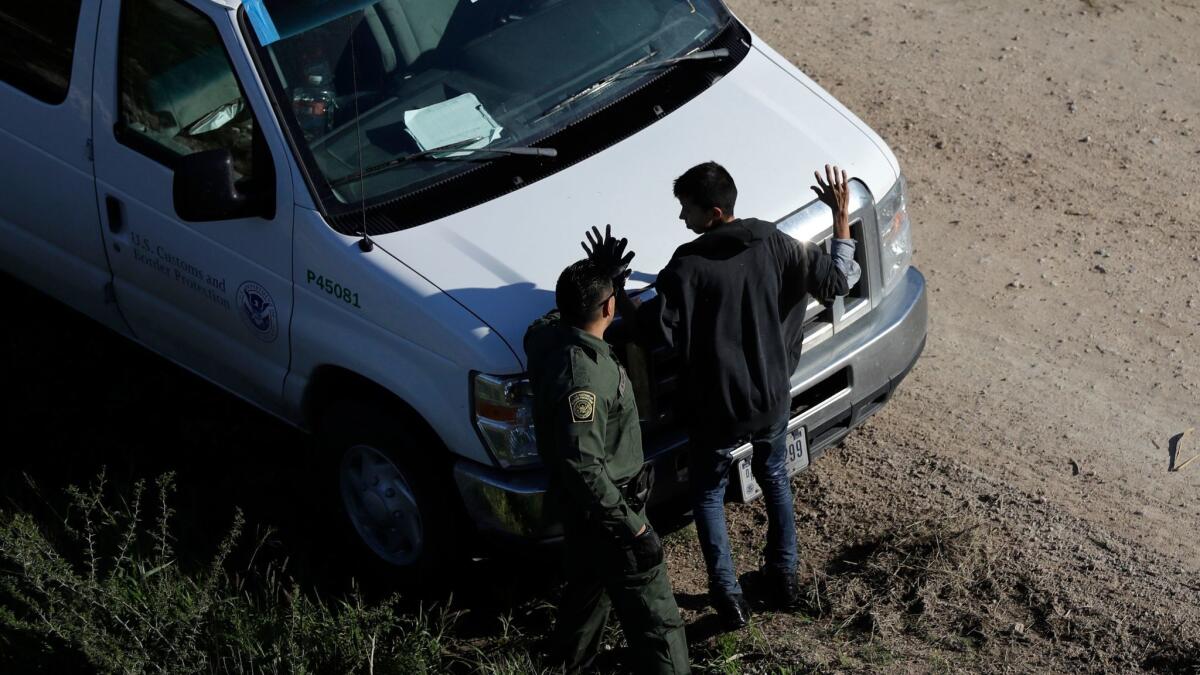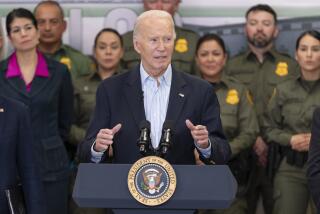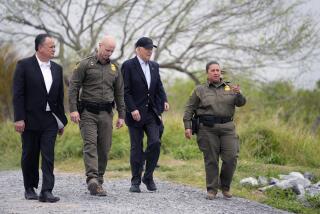Editorial: The Border Patrol has made improvements in accountability and use-of-force. Will Trump continue that progress?

Over the past three years, the Obama administration has struggled to change a culture of violence and impunity within the U.S. Border Patrol — a culture that has tolerated excessive force against suspected border crossers, including unnecessary lethal shootings. To its credit, the government has forced some improvements in both transparency and accountability, as well as reductions in the use of force, under Customs and Border Protection Commissioner R. Gil Kerlikowske, though the agency continues to face dogged problems with bribery and other underhanded actions by some of the agents.
Whether the Border Patrol will continue to improve under the Trump administration is an open question. Kerlikowske is retiring and President-elect Donald J. Trump has not yet nominated a successor. Mark Morgan took over as chief of the Border Patrol, answering to Kerlikowske, in October, the first outsider to be put in charge of the agency. A former assistant director of the FBI and military veteran (and one-time Los Angeles police officer), Morgan was brought in to the Border Patrol two years ago to revamp its troubled internal affairs department. His appointment as chief signals the seriousness with which the Obama administration is trying to force changes by challenging the institutional culture.
But Morgan will now be working for Trump, whose harsh anti-immigrant rhetoric during the campaign is well known and who has vowed to take dramatic steps (such as building an enormous wall along the Mexican border) to keep immigrants from entering the country without authorization. Despite getting little support from organized labor generally, Trump received a rare early endorsement in the primaries from the union representing border patrol agents, which has been critical of the Obama administration’s reform efforts and has accused it of seeking to “demoralize Border Patrol agents” and to “dismantle immigration enforcement.” In accepting the union’s endorsement, Trump didn’t emphasize the reforms that need to be made, but merely vowed to provide the agency with “the resources, tools and support they need to protect the United States and stop the influx of drugs, gangs and cartel violence.” Given that, there is reason to fear backsliding.
Civil liberties advocates who monitor some of the agency’s highway checkpoints say racial profiling and other abuses are regular occurrences.
The Border Patrol has more than 21,000 employees, making it one of the largest police agencies in the country. It’s part of U.S. Customs and Border Protection, which is one of seven sister agencies under the Department of Homeland Security. Trump’s nominee to run Homeland Security, retired Gen. John Kelly, will have ultimate authority over immigration enforcement (Immigration and Customs Enforcement, whose agents’ union also endorsed Trump, is part of Homeland Security, too). Kelly’s entire career has been in the military, and his public comments about border security reveal a hard-line attitude framed more by fear of terrorist infiltration than illegal immigration. Though Kelly doesn’t necessarily share Trump’s anti-Muslim sentiments — Kelly once said that U.S. troops “respect and even fight for the right of your neighbor to venerate any God he or she damn well pleases” — he has dismissed complaints about the savage treatment of Guantanamo detainees.
Members of the Senate need to plumb those attitudes during Kelly’s confirmation hearing. They should also ask themselves whether a career military officer is the right fit to run a sprawling agency with a history of civil liberties abuses.
When most people think of border enforcement, they think of, well, the border, and forget that the Border Patrol often ranges as far as 100 miles from the border to enforce immigration laws. Civil liberties advocates who monitor some of the agency’s highway checkpoints say racial profiling and other abuses are regular occurrences. But the government has so far failed to collect and analyze data on stops, so the extent of the problem is unknown. And it has not carried through with promises to outfit agents with body cameras.
When municipal police departments exhibit patterns of abuse, or bureaucratic cultures indifferent or hostile to basic civil liberties, the federal Department of Justice often gets involved, and sometimes as in the case of the Los Angeles Police Department after the Rampart scandal — forces reforms. But there is no such backstop for the Border Patrol. Despite scathing administrative reviews and independent reports, changes have been slow and insufficient.
So here’s another challenge for the Trump administration: securing borders and enforcing immigration and customs laws without adopting a militarized outlook or violating basic civil rights and civil liberties. We hope Trump, Kelly and whoever replaces Kerlikowske will rise to that important task.
Follow the Opinion section on Twitter @latimesopinion and Facebook
More to Read
A cure for the common opinion
Get thought-provoking perspectives with our weekly newsletter.
You may occasionally receive promotional content from the Los Angeles Times.






